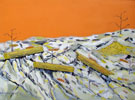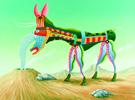戴卓群:真正的艺术家内在的线索一定是一致的。
Dai: The internal thread of the true artist is an unbroken one.
张小涛:我担心自己在工作中的不严谨,所以做了大量的思考和调查,我对藏学、佛教的研究,从资料、文献、图片的储备期很长。我必须要谈到的两个老师:北京大学文博学院的考古学家徐天进、陕西考古研究院的考古学家张建林,他们对我完成这个片子有重要的影响,尤其《萨迦》纪录片是以考古学家张建林的个人视点来展开的,动画电影中他是其中的一个虚拟角色,显得比较有意思。
Zhang: I worry about not being rigorous enough in my work, so I did a lot of thinking and investigation. I spent a lot of time researching Tibetology and Buddhism, collecting information, documents and pictures. Here I have to mention two teachers: Xu Tianjin, an archaeologist at the PKU School of Archaeology and Museology, and Zhang Jianlin, an archaeologist at the Shaanxi Archaeology Institute. They had a strong influence over my making of the films. In particular, the documentary unfolds around the personal viewpoints of Zhang Jianlin, while the animated film features him as a virtual character.
戴卓群:你对藏学的兴趣最初是从什么时候开始的?
Dai: When did your interest in Tibetology begin?
张小涛:2002年从藏传佛教美术开始的,对萨迦派的研究,包括对新媒体技术研究,它其实是一个系统,你需要对藏学的知识系统,对新媒体语言,实验动画的知识贮备,还有就是绘画得来的图像分析方法。其实你看它每一个图形的转化都是一个图像观念的转变,它通过隐晦的图像的暗喻,符号的暗示来表达艺术家的世界观,所以它是需要很多知识结构的整合与转移,我试图把跨学科、跨媒介的方法做一个具体的案例出来,学问在于“化”而不只是学习。王阳明讲:知行合一。知是行的开始,行是知的延伸。我们需要回到民间,回到传统,回到基层中去身体力行的实践。
Zhang: It began in 2002 with research into Tibetan Buddhist art. Research into the Sakya Sect, into new media techniques and other things came together to form a system. You need a knowledge system about Tibetology, a knowledge base about new media language and experimental animation, as well as the analytical methods from painting. You can see that the transformation of each image is an image-concept shift. It uses obscure image allusions and symbolic references to express the artist’s worldview, so it requires the organization and transference of a large knowledge structure. I have tried to create a specific case through cross-disciplinary, cross-medium methods. Knowledge takes place in action; it’s not just about learning. Wang Yangming said that knowledge and action are one. Knowledge is the beginning of action, and action is an extension of knowledge. We must return to folkways, to traditions, return to the foundation to engage in bodily practice.
戴卓群:那你现在应该有好几年时间对藏传佛教以及藏学的研究,当时是哪些方面触动你或吸引你的兴趣去走向这个方向呢?
Dai: So you have now researched Tibetan Buddhism and Tibetology for many years. What aspects of this originally attracted your interest, or spurred you to move in this direction?
张小涛:1993-2010年期间我去过川西藏区、甘南、西藏共七次,还是天生就有点迷恋这种气息。我的家乡重庆合川二佛寺是唐代的寺庙,有非常精美的石刻,气息高古,规模没有大足石刻那么大,但它的艺术成就非常高。可能与传统文化的熏陶对我的影响有关系,我本人对藏传佛教有一种敬意,2002年的时候,台湾的艺术家石晋华来东京画廊展览,他送过我一些藏传佛教的音乐,我听了很多年,有一种天然的神圣感和美感,有一种特别的感召力。当代艺术充满矛盾和悖论,既要颠覆、解构古典主义,但另一方面又要从古典主义当中获取营养,我不希望观者习惯性地把这个片子看作佛教宣传片或雪域高原的风光片。
Zhang: From 1993 to 2010, I made seven trips to the Tibetan area of western Sichuan, southern Gansu and Tibet, and I think I’m just naturally attracted to this atmosphere. The Hechuan Two Buddhas Temple in my hometown of Chongqing is a Tang dynasty temple that has beautiful stone carvings with an air of the ancient. The carvings are not as big as the ones at Dazu, but they are highly accomplished works of art. Perhaps it’s connected to the influence of traditional culture over me. I have a sense of reverence for Tibetan Buddhism. In 2002, Taiwanese artist Shi Jinhua held an exhibition at the Tokyo Gallery. He gave me some Tibetan Buddhist music that I’ve listened to for years. It has a natural feeling of sacredness and beauty. It is very enchanting. Contemporary art is full of contradiction and paradox. It wants to subvert and deconstruct classicalism, but it also must draw nourishment from classicalism at the same time. I do not wish for viewers to habitually view these films as promotions of Tibetan Buddhism or sightseeing videos of the Tibetan Plateau.
戴卓群:当代艺术原来颠覆和破坏古典的时候,用的是西方方法,西方语言,也就是说它借用了一种外来的工具进行颠覆,现在发现这种外来的工具越来越不任用,反而它原初要破坏的东西,跟它是真正兼容的。
Dai: When contemporary art subverted and destroyed classicalism, it applied western methods and western language. That is to say it borrowed external tools to engage in subversion. Now we’re discovering that these external tools are less and less powerful, and that they are truly compatible with what they were supposed to destroy.
张小涛:我小时候学书法、武术,对我后来影响很大,上大学学西方的艺术史、心理学、美学、哲学、社会学,历史等,当代艺术是另外的一套知识体系,很长时间我困惑传统文脉和当代艺术有什么关系呢?可是后来记忆里的东西开始激活,说不清楚到底是什么?但总有一种力量把我拉回到传统的河流中。我更强调知识考古、社会学、人类学的考察,怎么来看待藏传佛教在今天的命运?佛教与本土化、世俗化与全球化的关系?与地缘政治之间的关系?我是带着这种问题去进入《萨迦》这个项目,一开始就避免进入单维度的解读,我觉得这是做宗教片子最大的问题,我想带着疑问进去,没有标准答案,呈现的是一个思考和不断发现的过程。
Zhang: When I was young I studied calligraphy and martial arts, and this had a strong influence over me. In college I studied western art history, psychology, aesthetics, philosophy, sociology and history. Contemporary art is another knowledge system. I was perplexed for a long time about the relationship between traditional roots and contemporary art. But later, things in my memory were activated. I’m not sure what they are, but there has always been some kind of force pulling me back into the river of tradition. I place more emphasis on the investigation of the archaeology of knowledge, sociology and anthropology. How should we view the fate of Tibetan Buddhism today? How should we view the relationships between Buddhism, localization, secularization and globalization? How about the relationships of regional politics? I entered into the Sakya project with such questions on my mind. From the beginning, I avoided one-dimensional readings. I think that this is the biggest problem with religion films. I wanted to enter into it with doubts, without standard answers, presenting a process of thought and constant discovery.
戴卓群:你通过做《萨迦》有什么新收获?
Dai: What have you gained from Sakya?
张小涛:我谈谈动画方面的感受,这是一个新媒体技术和语言的问题,《迷雾》做得气势恢宏,后来慢慢体会到东方的东西,语言的收敛,内心的聆听,对题材和语言深度的消化。做《痕》那会儿我就已经开始变了,慢慢地走东方化、内心化、神秘主义的路子。做这个片子的时候我的团队更新了,没有以前用五十个人那么做了,做图、模型、剪辑、声音等分得非常细,工作仍然像以前一样,要求比以前更加苛刻,更加系统化。通过这个片子,对艺术生产的程序有一种豁然开朗的体会,我觉得有些东西是非要到一定的时候才能体会,年少气盛体会到的也许就是刚、强、狠,像绵延的,收放自如的东西出来是需要时间来实践的,以后慢慢的这个味道就出来了。技术和身体、心灵的融合也是很重要的,需要时间来发酵。
Zhang: I’ll talk about my perceptions making the animated film. It is an issue of the language and techniques of new media. Mist was grand and overbearing, but then I slowly got a better sense for oriental stuff, like reserved language, listening to the heart and the profound digestion of subject matter and language. When making Scar I had already begun to change, moving towards the East, towards the inner mind, towards mysticism. When I made this film, I made updates to my team. I no longer worked like before, with fifty people on the project. Now, the making of images, models, editing, sound and everything else were clearly delineated, while the work was the same as before. I had much stricter requirements, and pushed for more systematic work. Through the making of this film, I’ve had some enlightening insights about the production process of art. I think there are certain things that can only be realized at certain times. When you’re young, you may have realizations about strength, power and ruthlessness. Elegantly controlled things require a lot more time and practice, with that flavor only emerging slowly. The union of technique, body and soul is also very important, and that must ferment over time.
戴卓群:这应该是你本身的气质,《迷雾》我看到的也不是很刚很强,可能它表象是这样,但骨子里还是东方的内涵。
Dai: This is part of your own character. I didn’t see strength and power in Mist. Though it may have appeared as such on the surface, deep down it was still eastern.
张小涛:《迷雾》的音乐创作开始有点咄咄逼人,后来进行了不少的调整。一个团队需要全方位的融合,是一个整体。我喜欢往后藏,退一步,就像武学,真正的武功是藏的,是含而不发,是以守为攻的,是让的,手中有剑不是高手,手中心中都无剑才是高手,我很迷恋武学的境界和情怀,作品也是需要这种境界和格调的。如果我们过分追求技术会让一个人迷恋在一些小的细节里。
Zhang: The music in Mist was a bit overbearing at first, and we made quite a few adjustments. A team must completely fuse together as a unified whole. I like to keep things hidden, to step back a bit. It’s like martial arts. Real skill is hidden, kept inside. It’s about defense as attack, about passivity. The one with a sword in his hand is not a master. The true master carries no sword in his hand or his heart. I am obsessed with the psychological realm and sentiments of martial arts. The artwork also needs this kind of tone. If we pursue technique in excess, then people will get caught up in the details.




